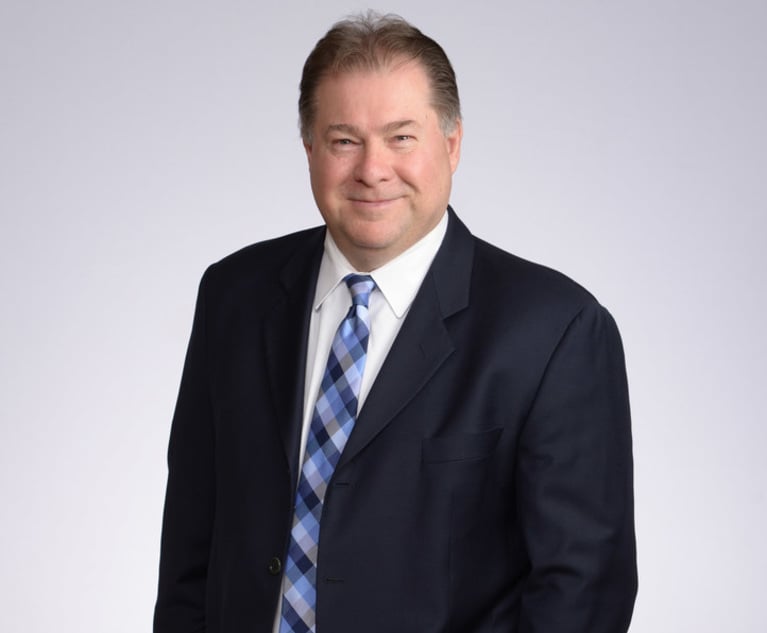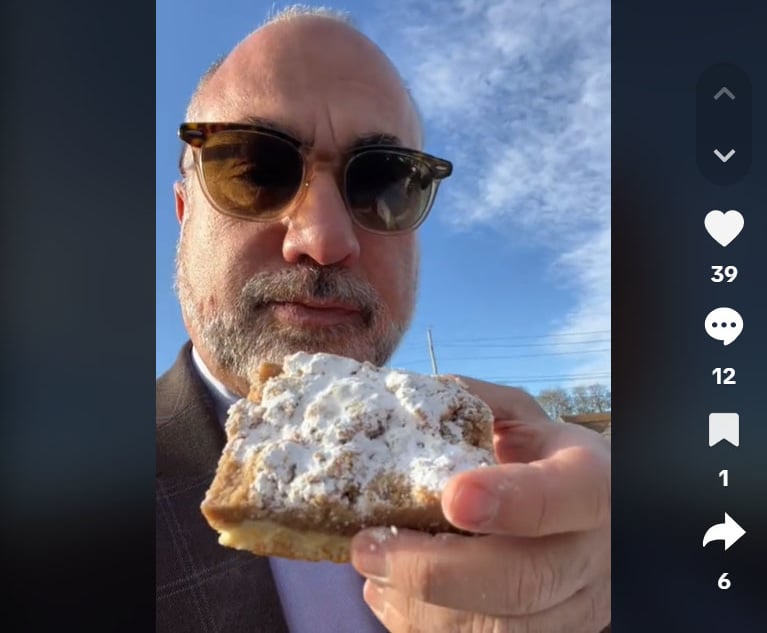 Alan Zuckerman, Flaster Greenberg.
Alan Zuckerman, Flaster Greenberg.'Slowly and Cautiously': Flaster Greenberg's Strategy to Reopen in the World of COVID-19
"We need to open our economy, but we need to do it slowly and cautiously," managing partner Alan Zuckerman says.
June 09, 2020 at 09:00 AM
6 minute read
Managing partner of Flaster Greenberg, Alan Zuckerman, shared his firm's carefully designed strategy to reopen its physical offices and operate safely as the COVID-19 economic recovery progresses. Flaster, headquartered in Cherry Hill, is a midsize commercial business law firm with about 50 attorneys. The firm also has offices in Princeton and Linwood, as well as in Pennsylvania, New York, Delaware and Florida. The firm represents businesses, such as technology companies, manufacturers, commercial real estate developers and health care providers, and also represents individuals in many matters, including estate planning, tax, and family law. Zuckerman is a corporate transactional and tax lawyer. The firm aims to open its New Jersey and Pennsylvania offices in mid-June.
Zuckerman's responses were edited lightly for style.
ALM: What sources are guiding you and other firm leadership in forming your strategy to safely reopen the firm?
Zuckerman: We had a non-lawyer management team, comprised of five head administrators, that met over several weeks. I met with the team and we submitted our plan to the firm's board of directors, which made a few policy suggestions, and then approved it.
We consulted with a physician at a hospital who was part of their COVID-19 response, to advise us in our policy decisions and to make them as science-based as possible. We wanted the opinion of someone who had firsthand experience with the COVID response and the appropriate safety measures.
We are following OSHA's "Guidance on Preparing Workplaces for COVID-19."
We are also looking at local bar association guidelines, and the New York Bar Association recently published general guidelines.
An engineer advised us on how to minimize the risk of the virus spreading through the HVAC system. We'll run the HVAC for 24 hours before employees initially return, and then on a daily basis, for at least an hour before employees enter the building.
We are consulting with our HR director and our attorney who heads our employment department regarding HR issues.
ALM: What are the policies and safety procedures that will be in place when employees return to your physical offices?
Zuckerman: There are a total of 100 employees at the firm, including about 50 staff members. We are initially allowing employees to come for two days per week.
We have divided our employees into "Group A" and "Group B," giving all the option to work remotely. We will have not more than 50% of our employees in the office at any time. A and B are divided strategically by job and geographic location within the physical office, so that employees will be socially distanced.
We are using an honor system for temperature screenings. Each employee will take their own temperature at home before coming to the office, and will check themselves for symptoms. A temperature of 100 degrees and above means stay home. We purposely said, if you have any symptoms, then stay home, since COVID can manifest so differently in different people.
At least one third of the people with COVID are asymptomatic, and you need to get close to people to take a forehead temperature scan. Also, the warm weather may make temperature reads higher, and people lining up in the office together is a concern.
Masks are required for all employees and visitors. We are providing one washable, reusable mask to each employee, and will have disposable masks in the office. Wipes and hand sanitizer will be placed near all common and high-touch areas, so surfaces, such as copiers, can be disinfected between each use. Even internal meetings will be conducted via Zoom.
We are putting up plexiglass by reception areas, and have rearranged office furniture and roped off certain common areas. Our cleaning service is coming daily, and we made sure they are using the right chemicals for COVID.
Eating in the common areas will be prohibited. Employees can eat individually at their desks, or go outside, since masks must be worn at all times when around other people.
We are not allowing employees to take public transportation initially, and no interoffice travel.
Some employees say they want to come back as soon as possible, while others prefer to stay home. We are going to try and accommodate people as much as we can. We understand employees have different health and child care issues. People have different mental health needs, and we understand some employees need to be out and about, and some are very anxious about being outside the home.
ALM: What sources are guiding your firm's decisions regarding HR issues?
Zuckerman: Our HR director and our attorney who heads our employment department has advised us on HR issues, such as how to communicate if an employee has COVID, sick time, and policy regarding employees who want to continue working remotely.
If an employee tests positive for COVID, they should email HR and it will be kept confidential. If that happens, we do plan to let our employees know that we had someone in the office who tested positive. We will do contact tracing of others that had contact with the employee, but will keep their identity confidential. We will keep records of all those that access the office for this purpose.
If an employee has someone in their household that has tested positive for COVID, we are going to handle this on a case-by-case basis, but will err on the side of isolation.
Last week we had a town hall Zoom conference with all of our employees to ask if there were questions, before formalizing the plan. We received very positive feedback regarding the safety measures and policies we are taking.
ALM: What are you monitoring as you move forward in terms of policies and employees?
Zuckerman: We are going to monitor if our employees report any adverse health issues, and we will see how productive employees are on the A and B schedule, but some of it will have to be reactive management.
We need to open our economy, but we need to do it slowly and cautiously. And, if there are pockets of outbreaks, we will be better prepared than we were a few months ago.
This content has been archived. It is available through our partners, LexisNexis® and Bloomberg Law.
To view this content, please continue to their sites.
Not a Lexis Subscriber?
Subscribe Now
Not a Bloomberg Law Subscriber?
Subscribe Now
NOT FOR REPRINT
© 2025 ALM Global, LLC, All Rights Reserved. Request academic re-use from www.copyright.com. All other uses, submit a request to [email protected]. For more information visit Asset & Logo Licensing.
You Might Like
View All
Appreciating the Important Work the Middlesex County Civil Bar Panel Does
7 minute read

Topping Kirkland, Weil Won the Most Valuable Major Bankruptcy Retentions of 2024

Battles Won, Others Abandoned: 2024 Brought Big Change to the Judiciary
6 minute readLaw Firms Mentioned
Trending Stories
- 1Judicial Conference Declines Democratic Request to Refer Justice Thomas to DOJ
- 2People in the News—Jan. 2, 2025—Eastburn and Gray, Klehr Harrison
- 3Deal Watch: Latham, Paul Weiss, Debevoise Land on Year-End Big Deals. Plus, Mixed Messages for 2025 M&A
- 4Bathroom Recording Leads to Lawyer's Disbarment: Disciplinary Roundup
- 5Conn. Supreme Court: Workers' Comp Insurance Cancellations Must Be Unambiguous
Who Got The Work
Michael G. Bongiorno, Andrew Scott Dulberg and Elizabeth E. Driscoll from Wilmer Cutler Pickering Hale and Dorr have stepped in to represent Symbotic Inc., an A.I.-enabled technology platform that focuses on increasing supply chain efficiency, and other defendants in a pending shareholder derivative lawsuit. The case, filed Oct. 2 in Massachusetts District Court by the Brown Law Firm on behalf of Stephen Austen, accuses certain officers and directors of misleading investors in regard to Symbotic's potential for margin growth by failing to disclose that the company was not equipped to timely deploy its systems or manage expenses through project delays. The case, assigned to U.S. District Judge Nathaniel M. Gorton, is 1:24-cv-12522, Austen v. Cohen et al.
Who Got The Work
Edmund Polubinski and Marie Killmond of Davis Polk & Wardwell have entered appearances for data platform software development company MongoDB and other defendants in a pending shareholder derivative lawsuit. The action, filed Oct. 7 in New York Southern District Court by the Brown Law Firm, accuses the company's directors and/or officers of falsely expressing confidence in the company’s restructuring of its sales incentive plan and downplaying the severity of decreases in its upfront commitments. The case is 1:24-cv-07594, Roy v. Ittycheria et al.
Who Got The Work
Amy O. Bruchs and Kurt F. Ellison of Michael Best & Friedrich have entered appearances for Epic Systems Corp. in a pending employment discrimination lawsuit. The suit was filed Sept. 7 in Wisconsin Western District Court by Levine Eisberner LLC and Siri & Glimstad on behalf of a project manager who claims that he was wrongfully terminated after applying for a religious exemption to the defendant's COVID-19 vaccine mandate. The case, assigned to U.S. Magistrate Judge Anita Marie Boor, is 3:24-cv-00630, Secker, Nathan v. Epic Systems Corporation.
Who Got The Work
David X. Sullivan, Thomas J. Finn and Gregory A. Hall from McCarter & English have entered appearances for Sunrun Installation Services in a pending civil rights lawsuit. The complaint was filed Sept. 4 in Connecticut District Court by attorney Robert M. Berke on behalf of former employee George Edward Steins, who was arrested and charged with employing an unregistered home improvement salesperson. The complaint alleges that had Sunrun informed the Connecticut Department of Consumer Protection that the plaintiff's employment had ended in 2017 and that he no longer held Sunrun's home improvement contractor license, he would not have been hit with charges, which were dismissed in May 2024. The case, assigned to U.S. District Judge Jeffrey A. Meyer, is 3:24-cv-01423, Steins v. Sunrun, Inc. et al.
Who Got The Work
Greenberg Traurig shareholder Joshua L. Raskin has entered an appearance for boohoo.com UK Ltd. in a pending patent infringement lawsuit. The suit, filed Sept. 3 in Texas Eastern District Court by Rozier Hardt McDonough on behalf of Alto Dynamics, asserts five patents related to an online shopping platform. The case, assigned to U.S. District Judge Rodney Gilstrap, is 2:24-cv-00719, Alto Dynamics, LLC v. boohoo.com UK Limited.
Featured Firms
Law Offices of Gary Martin Hays & Associates, P.C.
(470) 294-1674
Law Offices of Mark E. Salomone
(857) 444-6468
Smith & Hassler
(713) 739-1250






